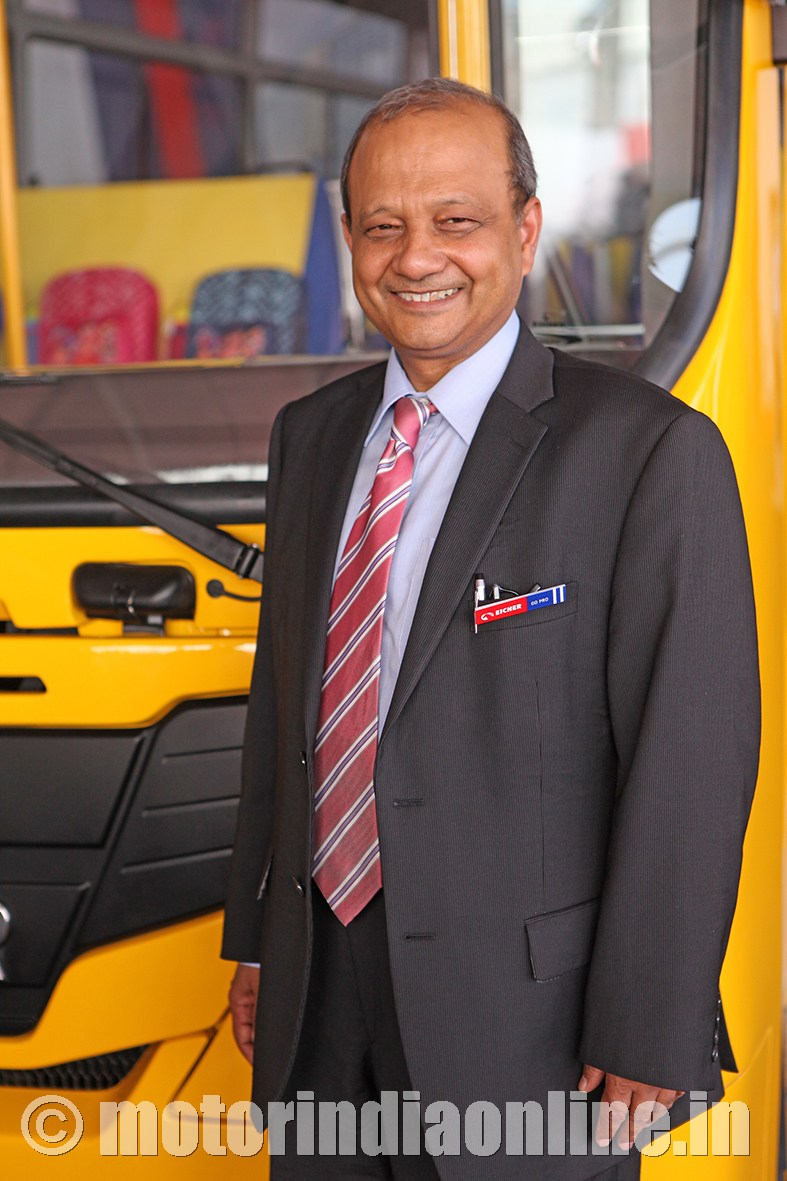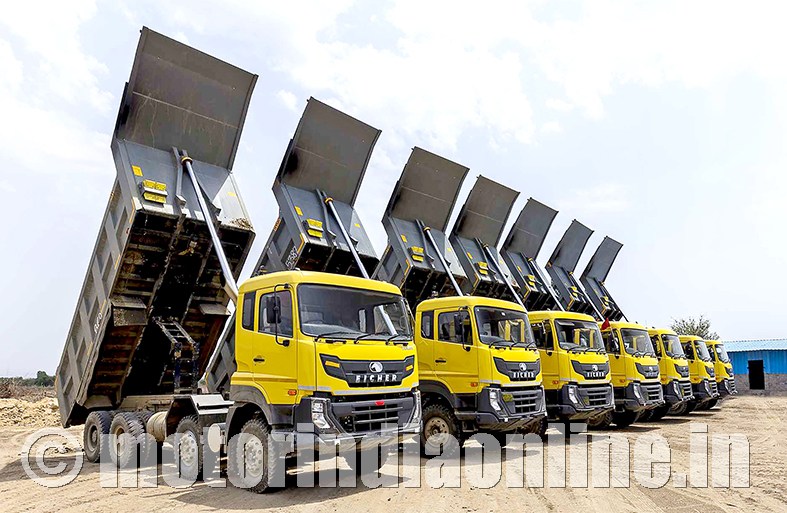Positive market outlook, along with comprehensive strategies and new products, puts ahead an exciting future for the automaker in India which aspires to be a ‘solution provider’ with customer-centric initiatives, including driver training and telematics technologies.

The Indian commercial vehicles industry is finally embarking on the ‘dawn of the new day’ moment in FY 2018-19. No more mood spoilers seem imminent ahead in for the next two years, at least, complementing the burgeoning demand prospects coming up like never before.
Volvo Eicher Commercial Vehicles (VECV), one of the largest CV joint ventures in the country, is bursting with excitement about a positive business scenario that is unfolding in the trucks and buses market. Ten years ago in 2008, two champions in their respective bastions – Volvo Group and Eicher Motors Ltd. – joined hands to develop a competent stable of commercial vehicles meeting all segment demands, something that the group now acknowledges as its core strength. The company has closed April with a growth of 28.1 per cent as against that of April 2017.
Team MOTORINDIA sat for a Q&A session with VECV’s MD and CEO Mr. Vinod Aggarwal on what’s in store for his company and the CV industry in the near future. Seemed overwhelmed on the positive outlook that looms the Indian heavy-vehicle industry, he said: “We have finally bounced back from the longest spell of recession since 2011-12. Although the 2015-16 period saw a strong come-back, the demand was hit by the demonetization move in 2016, resulting in over 25 per cent drop in sales for the industry in 2017 Q1. Supply side constraints out of BS-IV enforcement and GST dampened the scenario a bit, but the financial year ended with a notable performance”.
Mr. Aggarwal is confident that the upcoming years are going to be redefining, thanks to exceptional demand for trucks and buses on the making. He stems his observations based on three specific arguments. First, increased awareness of fleet operators on higher efficiency and improved productivity is generating raised appetite for new trucks powered with improved technologies, ‘value’ trucks in particular.
Second, tightened vigilance on over-loading, even in States that are known for laxity, is forcing operators to expand their fleets or shift to higher tonnage trucks. And the third is related to increased investments on infrastructure in the economy, which has resulted in higher demand for steel and cement, naturally pushing up demand in heavy-duty haulage and tipper segments. “Overall economic outlook is fast improving, making demand-push growth quite sustainable. VECV is in a position to grow better than the industry average. We have a strong and wide product range across all segments, applications, and engine ranges to pen a good success story”, he added.
Migration towards higher-segments
More so in trucking, GST is forcing logistics players to reconfigure their operations into ‘hub-and-spoke’ model, wherein higher capacity per vehicle and mileage-time equations are crucial. “Hence, there is a strong migration of demand from medium-duty trucks towards multi-axle heavy-duty and tractor trailers. This is a significant trend for the domestic trucks market to evolve”, feels Mr. Aggarwal, while also acknowledging that VECV is already stepping up its ante in the higher tonnage segments.
In the 37-tonne rigid-axle segment, demand has risen by almost three times from around 25,000 units in 2016-17 to over 70,000 units in 2017-18. “The Eicher Pro 6037 is garnering amazing response in recent times in the market, with customers appreciating its value-for-money approach in terms of cabin comfort and engine power-cum-efficiency”, claims the CEO. The truck has infused a lot of Volvo Group expertise and technologies in the segment, including cruise control, telematics, superior uptime and efficiency, and reliability.
The Eicher Pro tractors, on the other hand, has witnessed around 40 per cent surge in demand, with 42,000 units in 2016-17 blowing-up to over 70,000 units in 2017-18. “Even within tractors, 6×4 axle configurations are witnessing higher demand, proving that the end-users are quite keen on shifting to higher tonnages within the segment”, notes Mr. Aggarwal. Eicher has a wide range of tractors, starting from Pro 5035 and Pro 5040 to the flagship Pro 8049 (6×4) heavy-duty prime mover.
Tipper is another segment that is quite promising for VECV. Volvo branded tippers dominate high-end mining spectrum with 88 per cent market share, while the Eicher brand has offers tipper application in almost every segment, starting from light-duty construction tipper Pro 1080XPT (8.7 tonne GVW) to Pro 8031T and Pro 8031XM (8×4) heavy-duty mining tippers.
Buses, powertrains and exports
Asked on Eicher’s performance in the bus segment, Mr. Aggarwal replied less contented. “The bus industry was not performing well last year as expected, with a drop in sales to over 20 per cent. There was a lull in demand from STUs and private operators, while demonetization and GST uncertainties impacted the local bus body building industry to a great extent”, he replied.
He also acknowledges that many operators are migrating towards medium-duty buses, school and urban applications for instance, pushing the demand for heavy-duty, wide body models into doldrums.
For VECV, the 7-tonne and 9-tonne segments remain the stronghold for now, although the company is keen on consolidating the entire range. With a state-of-the-art bus building facility now in full swing, the company is confident to cater to more demand and work on new future products. “We have already showcased AMT and pure-electric bus technologies in our products and evoked good response among customers. Yet, it is wise to expect only slow migration towards those techs owing to higher initial costs”, the CEO admitted.
On exports, VECV has devised comprehensive plans to tap potential products by developing country-specific products. “We ended last year with all-time high export figures, around 9,000 units. Indonesia and South Africa are the primary RHD markets we engage with, while the middle-east region is taken care with specific LHD products”, Mr. Aggarwal said.
The group CEO also takes pride in the operations of Volvo Eicher Powertrain, clocking over 36,000 engines assembled at Pithampur, MP, last year. “We are the exclusive engine making hub for the Volvo Group in the region, catering to its requirements from medium-duty products and Asian operations (UD brand), alongside powering medium-duty and heavy-duty Eicher Pro trucks and buses”, he said.
New Products: VECV aims at haulage segments
With the multi-axle, rigid-type haulage trucks taking up Indian roads in full swing, VECV is prepping itself for a serious game in the semi-premium ‘value’ trucks market. The group’s CEO has affirmed that new products and multiple axle configuration variants are on the making for the domestic market. This plausibly includes a new model in the Pro 6000 series with a GVW match 42 tonne mark using 12×2 axle configuration.
In the tractor segment, Eicher is also confirmed to be working on a 6×4 variant in the Pro 6000 series. A test mule was reportedly spotted testing in the outskirts of Indore. Further, the Pro 8000 series heavy-duty trucks assembly is now shifted to Pithampur, MP, enabling the company to expand volumes for both domestic and international demands.
First-ever Eicher Academy for drivers inaugurated
In an effort towards conducting skill development programs for the driver community, the Eicher Group Foundation, CSR arm of the Eicher Group, inaugurated the Eicher Academy for Drivers at Indore to impart high quality pre-licensing training for drivers of commercial vehicles. It has signed an MoU with the Directorate of Skill Development, Government of Madhya Pradesh.
The Academy will provide hands-on learning and training on the vehicles and safe practices for aspiring and existing commercial vehicle drivers. It is equipped with state-of-the-art infrastructure – multimedia enabled classrooms, a test track for driving practice, advanced simulators to develop road behavior and technical labs for mechanical education. The trainees will go through rigorous sessions on aspects such as vehicle maintenance, heath and safe practices as well as soft skills for their overall welfare. Final certifications and accreditations will be provided by ADSC.
Commenting on this initiative, Mr. J.P. Verma, Vice President, VECV, said: “The automotive industry currently faces an acute shortage of skilled drivers. We are committed to promote up skilling and employment generation in the CV industry. The academy is an endeavor for an impactful program which will not just address the need gap by educating the drivers on the required skill sets but also improve driver productivity and retention.”



